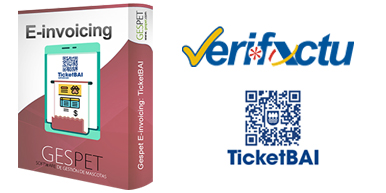
Electronic invoicing with TicketBAI and Verifactu
Gespet E-invoicing: Integration with Verifactu and TicketBAI
In recent years, governments in several countries have introduced measures to
combat tax fraud and increase consumer confidence by implementing electronic
invoicing systems.
These systems allow invoices to be generated, verified, and authorized directly
by tax authorities, providing stricter control over business transactions.
What is an electronic invoice and how does it work?
An electronic invoice is a digital document that records a transaction between a
buyer and a seller.
What makes it different from a traditional invoice is
that it must meet certain technical and legal requirements to be validated by
the relevant tax authority. In general, the process includes:
Creation: The issuer generates the invoice in electronic format.
Validation: The invoice is sent to the tax administration to be validated and authorized. This step ensures the data is accurate and compliant with tax regulations.
Certification: Once validated, the invoice receives a unique code or digital certificate that guarantees its authenticity.
Storage & Access: The electronic invoice must be stored by both the issuer and the recipient, ensuring accessibility for future audits.
European Union countries and their electronic invoicing systems
Each EU country is adopting its own electronic invoicing system with specific characteristics. Below is a brief overview of the systems implemented in some member states:
Spain: Two main systems are used: Verifactu and TicketBAI. Verifactu verifies invoices issued by businesses and professionals, while TicketBAI is mandatory for companies in certain regions (such as the Basque Country) and focuses on ensuring correct reporting of sales.
Italy: A pioneer in adopting e-invoicing with its Sistema di Interscambio (SdI), which requires all businesses to issue electronic invoices for both B2B (business-to-business) and B2C (business-to-consumer) transactions.
France: The system is called Chorus Pro, mandatory for all businesses invoicing the public sector, with plans to expand it to commercial transactions in general.
Portugal: The e-Fatura system requires all invoices to be electronically registered with the Autoridade Tributária e Aduaneira.
Germany: Adoption has been slower, but ZUGFeRD has been implemented to support hybrid electronic invoices, readable by both humans and electronic systems.

Outside the European Union
It’s not only EU countries adopting these measures. Several countries outside the EU have already implemented or are in the process of implementing electronic invoicing systems. Some examples include:
Mexico: The CFDI (Comprobante Fiscal Digital por Internet) system is one of the most advanced worldwide. In Mexico, all business transactions must be registered and validated by the Tax Administration Service (SAT).
Brazil: The Nota Fiscal Eletrônica (NFe) has been in place since 2007 and is mandatory for most companies, with strict validation by the Ministry of Finance.
Argentina: Electronic invoicing is mandatory for a wide range of sectors, overseen by the Federal Administration of Public Revenue (AFIP).
Chile: Mandatory e-invoicing for all businesses, managed by the Internal Revenue Service (SII).
Colombia: Electronic invoicing is mandatory for many companies and managed by the National Tax and Customs Directorate (DIAN).
Peru: Mandatory e-invoicing for businesses in certain sectors, managed by SUNAT (National Superintendency of Customs and Tax Administration).
Uruguay: The electronic invoicing system, known as Comprobante Fiscal Electrónico (CFE), is mandatory for most companies and managed by the DGI (General Tax Directorate).
Ecuador: The electronic invoicing system managed by the Internal Revenue Service (SRI) is mandatory for several taxpayer categories.
India: Mandatory e-invoicing was introduced for large companies in 2020, managed by the Goods and Services Tax Network (GSTN).
China: Gradually implementing its electronic invoicing system, known as Electronic Fapiao, across regions and sectors.
Saudi Arabia: Implementing a mandatory e-invoicing system through ZATCA (Zakat, Tax, and Customs Authority) in two phases, the first starting in 2021.
United Arab Emirates: Not yet mandatory nationwide, but the UAE is advancing its implementation through the Federal Tax Authority (FTA).
South Africa: Currently studying the implementation of e-invoicing to improve tax control and reduce fraud.
The challenges of electronic invoicing
While these systems aim to improve tax transparency and reduce fraud, they also present challenges for businesses:
Initial costs: Implementing an electronic invoicing system involves significant upfront costs, not only in technology but also in training and process adaptation.
Regulatory compliance: Each country has its own rules, and businesses operating in multiple jurisdictions may struggle to keep up with different requirements and technical standards.
Integration with existing systems: Many businesses already use ERP systems and accounting processes. Integrating e-invoicing with these can be complex and costly.
Maintenance and updates: E-invoicing systems require ongoing maintenance to ensure compliance with frequent legal and technical updates introduced by tax authorities.
How can we help you?
Gespet, as you know, is an ERP+CRM (Enterprise Resource Planning + Customer Relationship Management) that helps professionals manage and automate internal processes and customer relationships from a single, centralized platform.
It’s not a specific invoicing or accounting system. We know that implementing e-invoicing can be extremely complex. Our goal is to support you by simplifying the process and providing a solution adapted to each country’s requirements and regulations.
That’s why we developed Gespet E-invoicing: to offer you integrations that allow you to issue and submit your electronic invoices easily and in compliance with the legislation of different countries, through certified and market-leading providers.
Spain
The first country we’ve integrated into Gespet E-invoicing is Spain, where there
are two systems: Verifactu and TicketBAI.
| System | Region | Effective date | Applies to |
| Verifactu | Spain, except Basque Country | Euskadi and Navarra | January 1, 2026 (companies) July 1, 2026 (freelancers/individuals) |
All companies (B2B) and freelancers |
| TicketBAI | Álava | December 1, 2022 | Companies and freelancers in Álava |
| Gipuzkoa | Mid-2023 | Companies and freelancers in Gipuzkoa | |
| Bizkaia | January 1, 2024 | Companies and freelancers in Bizkaia |
This information may not be fully up to date and could have changed depending on current regulations. If you’re unsure whether it applies to you or if you have questions, we recommend consulting your tax advisor or the relevant tax authority directly.
You can read detailed information about each system below:
Verifactu TicketBAI
Did you find it interesting?
If you have any questions, you want to propose that we write a help guide or a post on a topic or you just want to chat with us, don't hesitate. We are delighted to talk with you and get your opinion.

LANGUAGE
CATEGORIES
POPULAR POST
Black Friday Ideas for Pet Businesses
New features included and user suggestions
The all-in-one agenda every breeder needs
Differences between full invoice and simplified invoice
Electronic invoicing with TicketBAI and Verifactu
New features included and user suggestions
Configurable online booking form and GDPR
FOLLOW
JOIN OUR TEAM
Follow us on social media and join our mailing list for advice and tips to run your pet-care business
TAGS:
electronic invoicing pet businesses
Verifactu pet businesses
TicketBAI pet businesses
Verifactu pets
TicketBAI pets
